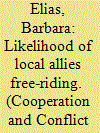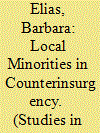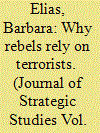|
|
|
Sort Order |
|
|
|
Items / Page
|
|
|
|
|
|
|
| Srl | Item |
| 1 |
ID:
124210


|
|
|
|
|
| Publication |
2013.
|
| Summary/Abstract |
Despite strong shared interests and their dependence on US assistance, Kabul and Islamabad frequently fail to cooperate with the USA's post-9/11 security agenda. Why doesn't the USA have more leverage in these alliances and what can it change to be more influential? This article identifies four structural factors in Washington's alliances in Afghanistan and Pakistan ('Af-Pak') contributing to Washington's lack of coercive power: 1) the USA's interest makes coercion difficult; 2) Kabul and Islamabad have more invested and will bargain to protect their interests; 3) the form of US commitment (an intense but explicitly temporary military commitment) produces incentives for Kabul and Islamabad to adopt short-term solutions, frequently running against US interests; and 4) the tenets of counterinsurgency policy cause Washington to be politically dependent on Kabul and Islamabad, effectively reducing its influence.
|
|
|
|
|
|
|
|
|
|
|
|
|
|
|
|
| 2 |
ID:
160236


|
|
|
|
|
| Summary/Abstract |
Alliance politics are critical yet understudied in counterinsurgency interventions. Despite the importance of local allies, traditional research on alliances fails to account for the challenges of managing in-country counterinsurgency security partners or explain variation among which types of policy requests from large intervening allies are likely to result in compliance or defiance by local partners. When did US intervening forces have leverage in Iraq and Afghanistan, and when was American influence limited? Utilizing thousands of US government documents to analyze over 250 US demands of allies in Kabul and Baghdad, this paper reexamines established variables in the literature on inter-alliance bargaining—namely allied interests and dependencies—to offer a new model describing the interaction of these variables in asymmetric counterinsurgency partnerships. The theory predicts when large allies are likely to influence local partners and when these intervening forces will likely fail to coerce them.
|
|
|
|
|
|
|
|
|
|
|
|
|
|
|
|
| 3 |
ID:
179928


|
|
|
|
|
| Summary/Abstract |
In counterinsurgency, U.S. officials often feel trapped by a localally who appears unable to survive the departure of U.S. forces. Advocates for withdrawal argue that only a deadline to depart will induce local governments to accept greater burdens, while critics of this position argue that plans to withdraw embolden insurgents. We argue instead that American leaders gain leverage from U.S. public opinion favouring withdrawal. Analysis of 200+ U.S. demands of local allied governments in Vietnam and Iraq suggests that public pressure for withdrawal is associated with greater local compliance, but that formal U.S. withdrawal plans does not motivate compliance.
|
|
|
|
|
|
|
|
|
|
|
|
|
|
|
|
| 4 |
ID:
154731


|
|
|
|
|
| Summary/Abstract |
In counterinsurgency interventions, free-riding by small, local allies is persistent. Yet, the literature on free-riding by small allies is largely limited to conventional multilateral partnerships, such as the North Atlantic Treaty Organization, neglecting other types of asymmetric alliances. Using new data containing 144 US requests to local allies in Vietnam, Iraq and Afghanistan, this article tests the logic of economic theories of alliances in counterinsurgency interventions. I find even when small allies are explicitly asked to contribute to alliance-wide security goods, they are likely to free-ride almost half the time (45%), and the likelihood of free-riding is dependent on whether local allies can be excluded by larger allies. This conclusion upholds the logic of economic models, since shared defense goods that exclude local allies fail to meet the criteria of public goods.
|
|
|
|
|
|
|
|
|
|
|
|
|
|
|
|
| 5 |
ID:
181735


|
|
|
|
|
| Summary/Abstract |
In counterinsurgencies, minority groups such as the Sunnis in Iraq are important elements of the “population,” the social–political terrain where population-centric counterinsurgency is battled. Yet there has been little systematic analysis of minority groups in unconventional warfare and no investigation of the ways intervening forces, like the United States, have approached in-country allies in an effort to get host nations to address the strategic importance of minorities. Examining new data on alliance politics between the United States and local partners in Vietnam and Iraq, I find that while existing scholarship would suggest that in-country allies will resist U.S. pressure to engage with minority groups, local allies are surprisingly likely to comply, at least in part, in order to avoid U.S. unilateral engagement with local minorities and to influence the policies adopted. This process slowly undermines U.S. counterinsurgency efforts, speaking to the complexities of population-centric approaches and working through local proxies.
|
|
|
|
|
|
|
|
|
|
|
|
|
|
|
|
| 6 |
ID:
186092


|
|
|
|
|
| Summary/Abstract |
Why do some rebels form persistent battlefield coalitions with terrorist groups? I argue three factors are likely to condition whether the benefits of doing so outweigh the costs: 1) potential rivalry among coalition members’ political agendas, 2) the military, organizational, and political value terrorists can bring to the collective, and 3) the degree to which local partnerships are institutionalized or reinforced through threats of intra-coalitional violence. Analyzing previously classified and captured primary source documents, I examine the Taliban’s persistence in forming battlefield coalitions with al-Qaeda in Afghanistan (1979 – present) and find significant empirical support for the argument.
|
|
|
|
|
|
|
|
|
|
|
|
|
|
|
|
|
|
|
|
|